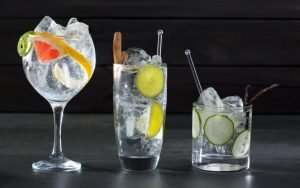The Impact of Sparkling Water on Your Teeth

Drinking sparkling water seems like a good idea – it combines our natural need for hydration with no-calories (if unflavoured) and natural water.
However, sparkling water has recently been in the news for having acid levels higher than that of regular water.
And studies have shown that a higher level of acidity in beverages may threaten tooth enamel.
The reason for this is chemical– when carbon dioxide is dissolved in water to create carbonation, it produces carbonic acid, which comes with the risk of eroded tooth enamel.
Because our patients have asked us about the safety of sparkling water, Warner Lakes Dental has taken an in-depth look at the subject to bring you the answer to the question, “Sparkling water – what is its impact on teeth?”
How Could Sparkling Water Be Harmful?
With no sugar or ingredients other than carbon dioxide, how can sparkling water harm your health? The answer lies in a chemical reaction in your mouth. Every time you take a drink, this is what happens:
- Carbon dioxide turns into carbonic acid (this is what gives your drink that tingly feeling).
- In laboratory studies, this acid can erode tooth enamel.
- If your tooth enamel is eroded, teeth become prone to tooth sensitivity and other serious dental problems as the protective layer of your teeth are weakened.
And issues with sparkling water become much more severe if they are flavoured because flavouring usually means extra sugar or citric acid.
Looking At The Science
A 2001 study published in the Journal of Oral Rehabilitation, found: “Mineral waters appear to offer a safe alternative to more erosive acidic beverages.”
The study concluded that sparkling waters were dramatically less erosive than soda, although sparkling water was not compared to plain water.
A study from 2007 came to a different conclusion. Researchers soaked teeth in seltzer-filled containers for half-an-hour to measure the effect of sparkling water on enamel.
They found that sparkling waters “demonstrated erosive potential similar to or greater than that of pure orange juice, an established erosive drink.”
In fairness, this is a fairly unrealistic study, as very few drinks remain in a mouth for more than a few minutes, and they do not “soak” the teeth.
A 2016 study in the Journal of the American Dental Association characterised some Gatorade and Powerade drinks as “extremely erosive” or “merely erosive.”
Comparatively, Pellegrino Sparkling Natural Mineral Water was listed as “erosive,” while Perrier carbonated mineral water was tagged “minimally erosive.”
The American Dental Association discovered that Pellegrino is on the edge of “erosive” and “minimally erosive.”
So, the data suggests that mineral water is either minimally or slightly erosive even in circumstances that are worst for the teeth.
What all this science adds up to is that sparkling water may present a theoretical risk of tooth erosion, but you’d have to drink an awful lot of it over a very long period to harm your teeth.
These effects are worse if the sparkling water is flavoured or contains sugar, but the damaging effects of sugar are already well known.
Drinking Sparkling Water Sensibly
Instead of an all-or-nothing approach to sparkling water, use the following strategies to make your sparkling water consumption safe.
- Don’t drink it constantly. The main threat from carbonated beverages comes from continuous consumption. The best beverage you can drink is plain fluoridated water, as it gives your teeth a break from contact with acid.
- Decrease sparkling water contact with teeth. The quicker a drink gets past your teeth, the less contact there is. This decreases erosion time and allows saliva is allowed to neutralise the acid in your mouth. So don’t slowly sip – drink quickly, and then move on.
- Drink it with a meal or snack. Eating stimulates the flow of acid-neutralising saliva.
- Don’t swish. Don’t hold or swish carbonated water in your mouth.
- Rinse with regular water after drinking sparkling water.
- Use a straw. A straw keeps fluid away from your teeth.
- Chew Xylitol gum. Sugar-free Xylitol gum helps battle acidity in your mouth.
- Brush your teeth after 30 minutes. Don’t brush just after drinking acidic drinks – they temporarily weaken the teeth. But after 30 or 40 minutes it is a good strategy.
The Warner Lakes Dental Care Experience
Warner dentist wants your visit to be the quickest and most convenient dental experience possible. From parking to treatment, we try to make the entire process as simple and painless as possible.
From routine check-ups and cleans to root canals, extractions, and cosmetic procedures, Warner Lakes Dental is your partner in dental health.
We want you to enjoy the Dental Health Week, and beyond, with a stunning smile and healthy mouth, teeth, and gums!
Call (07) 3477 9925 or visit us at Warner Lakes Medical Precinct 1185B Old North Rd in Warner.
